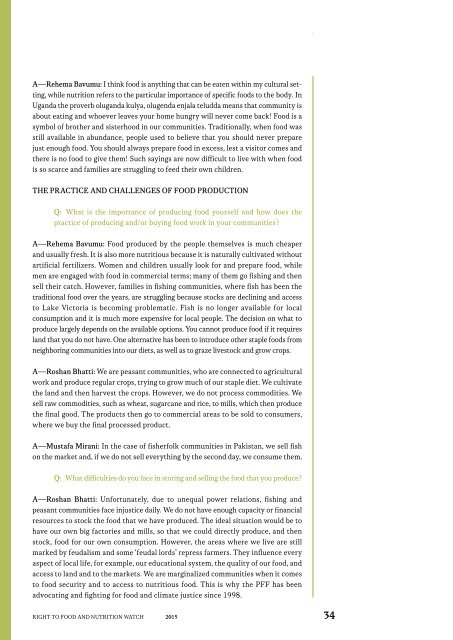RIGHT TO FOOD AND NUTRITION WATCH
1iNBHTY
1iNBHTY
Create successful ePaper yourself
Turn your PDF publications into a flip-book with our unique Google optimized e-Paper software.
AARehema Bavumu: I think food is anything that can be eaten within my cultural setting,<br />
while nutrition refers to the particular importance of specific foods to the body. In<br />
Uganda the proverb oluganda kulya, olugenda enjala teludda means that community is<br />
about eating and whoever leaves your home hungry will never come back! Food is a<br />
symbol of brother and sisterhood in our communities. Traditionally, when food was<br />
still available in abundance, people used to believe that you should never prepare<br />
just enough food. You should always prepare food in excess, lest a visitor comes and<br />
there is no food to give them! Such sayings are now difficult to live with when food<br />
is so scarce and families are struggling to feed their own children.<br />
THE PRACTICE <strong>AND</strong> CHALLENGES OF <strong>FOOD</strong> PRODUCTION<br />
Q:<br />
What is the importance of producing food yourself and how does the<br />
practice of producing and/or buying food work in your communities?<br />
AARehema Bavumu: Food produced by the people themselves is much cheaper<br />
and usually fresh. It is also more nutritious because it is naturally cultivated without<br />
artificial fertilizers. Women and children usually look for and prepare food, while<br />
men are engaged with food in commercial terms; many of them go fishing and then<br />
sell their catch. However, families in fishing communities, where fish has been the<br />
traditional food over the years, are struggling because stocks are declining and access<br />
to Lake Victoria is becoming problematic. Fish is no longer available for local<br />
consumption and it is much more expensive for local people. The decision on what to<br />
produce largely depends on the available options. You cannot produce food if it requires<br />
land that you do not have. One alternative has been to introduce other staple foods from<br />
neighboring communities into our diets, as well as to graze livestock and grow crops.<br />
AARoshan Bhatti: We are peasant communities, who are connected to agricultural<br />
work and produce regular crops, trying to grow much of our staple diet. We cultivate<br />
the land and then harvest the crops. However, we do not process commodities. We<br />
sell raw commodities, such as wheat, sugarcane and rice, to mills, which then produce<br />
the final good. The products then go to commercial areas to be sold to consumers,<br />
where we buy the final processed product.<br />
AAMustafa Mirani: In the case of fisherfolk communities in Pakistan, we sell fish<br />
on the market and, if we do not sell everything by the second day, we consume them.<br />
Q:<br />
What difficulties do you face in storing and selling the food that you produce?<br />
AARoshan Bhatti: Unfortunately, due to unequal power relations, fishing and<br />
peasant communities face injustice daily. We do not have enough capacity or financial<br />
resources to stock the food that we have produced. The ideal situation would be to<br />
have our own big factories and mills, so that we could directly produce, and then<br />
stock, food for our own consumption. However, the areas where we live are still<br />
marked by feudalism and some ‘feudal lords’ repress farmers. They influence every<br />
aspect of local life, for example, our educational system, the quality of our food, and<br />
access to land and to the markets. We are marginalized communities when it comes<br />
to food security and to access to nutritious food. This is why the PFF has been<br />
advocating and fighting for food and climate justice since 1998.<br />
<strong>RIGHT</strong> <strong>TO</strong> <strong>FOOD</strong> <strong>AND</strong> <strong>NUTRITION</strong> <strong>WATCH</strong> 2015 34


